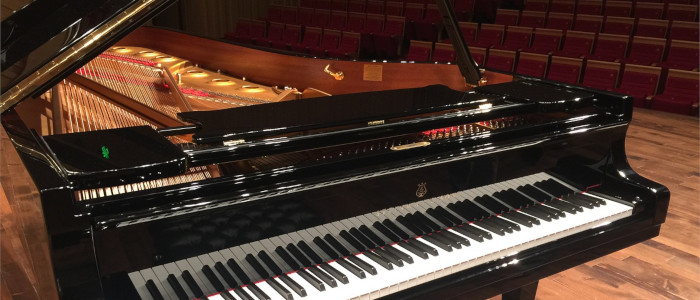Piano Recital Ideas and Tips

Every January I go into "recital prep" mode. I hold our annual recital each year in spring, so I like to have everyone's performance pieces chosen by January/February so we have time to refine them before the performance. If you're a piano teacher, chances are you're doing the same thing right now in your studio.
Over the years I've tried a variety of things when it comes to recitals, and I've heard all kinds of ideas from colleagues and student families. I'd like to share a few of my favorite ideas to help you plan your recital.
Choose a Theme
Like any other event, a piano recital is often better with a theme. Ideas for a piano recital theme could be:

A recital "theme" is a great idea for so many reasons....
You expose your students to different types of music that they may otherwise never have heard and which they may fall in love with (or may give them a good educational challenge!). Each recital will feel familiar, yet new and different for your performers.
You expose your recital attendees to new kinds of music, which keeps everyone wanting to come back every year to listen.
In your search to find music that fits the theme, you may discover new music you've never heard before (which is always welcome for a piano teacher!).
You have a clear direction to follow for recital decor and any awards or prizes you may give out. (You can even project images on a screen for each piece.)
You can choose a dress code to match. Personally, I always have my student performers dress up more formally no matter the theme. But many teachers like to do things like "Costume contests" for a Halloween season recital, or "Pajamas" for a Movie music recital (complete with old-time popcorn bags).
Don't Allow Duplicates
Don't let multiple students perform the same piece.
Some teachers think this kind of thing is fine as long as they're not performing one right after the other, or as long as they're different arrangements.
But I believe it's best to avoid duplicates altogether. Even if it's a different arrangement, both students performing "Jingle Bells" are thinking, "Hey, they're playing my piece..." and inevitably, they start to compare their performances.
Of course, beginner students can tell when a more experienced 5th-year or 10th-year student performs. Obviously, they can form ideas about who is a "better pianist." But there's no reason to encourage a personal-level comparison, like, "He can play Jingle Bells WAY better than I can..." and psyche a student out before they've even approached the piano! You never want to foster feelings of insecurity before a performance, especially if the performers are of a similar level or age (or the younger one is the better pianist).
Also, while piano recitals are (ideally) fun for all involved, how many parents (and restless younger siblings) want to sit and listen to 5 or 8 different versions of Jingle Bells in one hour?
You can avoid duplicates by fostering interest in a variety of new and interesting pieces. Pieces can be selected as "first come, first served". Once a piece is selected, it's off the table. Any other requests can be given different selections, perhaps a piece that is similar in feel or perhaps the same lyrics set to different music (like the differing versions of Away in a Manger).
And if you have two students who are both BEGGING to perform Jingle Bells and nothing else, try these approaches: Let them perform it as a duet, OR, let them both at least learn it, and whoever learns it first gets to perform it while the other must choose another piece. (Motivation to practice hard!)
Include Advanced Performances (Consider Performing Yourself!)
Advanced-level performances provide something for your beginner students and their guests to look up to. Especially if you have younger intermediate or advanced performers, this encourages similarly-aged beginners to strive harder for greatness. And you should consider performing yourself, especially if you don't have any or many advanced students.
Performing at your own students' piano recital is a somewhat polarizing topic. Some teachers say "It isn't about me, it's about the students." But performing for your students shows them what they can look up to. It shows them that even at your level, you are still practicing and performing. Many teachers rarely perform otherwise, and what better environment? If you are not entirely comfortable with the idea, consider performing at the occasional recital -- just once every few years. (This is what I do, as I also perform and accompany in other settings.)
Also, from a business perspective, performing at your recitals shows your students and your guests that you really DO know what you're doing. It encourages greater respect from your students, better adherence to your lesson policies, fewer challenges from difficult parents, and more referrals for future business.
As a side note, exercise caution if you invite guest performers. I have heard many stories about guest pianists attempting to "recruit" students for themselves from the hosting teacher! If you invite a guest to perform, make sure you have a mutual understanding and respect for each other so you avoid any sticky or uncomfortable situations.
Don't Let It Go Too Long

Most piano recitals should probably be no longer than around one hour. I would love to say that recital guests are happy to sit and listen for three hours, but it's simply not true for the majority. Many bring younger siblings or infants who get restless. Many teens and adults get restless. In today's entertainment world, most people no longer sit through blissful hours of a music-only performance. The last thing you want at your recital is screaming children and grumpy guests who don't want to come back next year. So for the sake of your guests, try to keep your recital short and sweet.
Something to bear in mind is that more advanced solo piano pieces are usually longer. If you have advanced performers, consider trimming the length of their performance piece(s). Choose something impressive but short to help your guests stay focused, appreciative, and respectful. This should apply to student performances and your own performance (if you choose to do that).
This DOESN'T mean you should never perform long pieces! There are many BEAUTIFUL lengthy pieces of music out there that audiences should be exposed to. The solution is finding the right setting, and it's probably not going to be at the full studio recital where everyone performs from the newest beginner to the longest-running student.
Sometimes the solution is splitting your recital in two events. With fewer students performing at each recital, you can have longer performances and expect an appreciative audience. You can also have students perform multiple pieces.
You can also add more selective performances throughout the year. You might hold a master class or a select group performance in which longer, more challenging pieces are performed. For a graduating senior, you might host a senior recital where the senior performs multiple pieces to showcase his or her talent. In these contexts, your guests will have different expectations.
Include a Variety of Skill Levels
Piano recitals should have a variety of skill levels whenever possible. It's important for new students to see intermediate and advanced pianists play, and it's important for more advanced players to respect the beginners (which they once were!).
Ideally, you'll hold one recital with all your students so that everyone can hear everyone perform and your guests can mingle together afterward. However, if your studio is large or you have long musical numbers, it may be better to hold 2 or even 3 recitals. In these situations, try to have a variety of skills represented at each recital. If all your beginners are at one recital (with no intermediate or advanced students), those guests may believe you only teach beginners, and the performers will never get to hear more advanced piano music.
Hold a Reception Afterward
A simple reception after the recital helps your students and families get to know one another. Students who otherwise would never have met can bond quickly over a shared recital experience. A reception also allows you to spend a minute or two with each performer and their guests. I have gotten new students this way (be ready to hand out business cards!).
An easy way to make this happen is to have food. Where there's food, people congregate. Finger foods are the best refreshments because you don't need utensils. I ask my student families to each bring a finger food refreshment to share and we always have a variety, from store-bought cookies to homemade cupcakes to fruit platters to chips and dip.
Pass Out Compliment Cards

Compliment cards let your guests provide specific positive feedback about the students' performances. Students are so pleased when they hear the good things people say about their performances.
There are a few different ways to handle compliment cards. To ensure every performer receives compliments, you may pass out enough cards to the guests for every individual performer, but be advised this may cause your guests to feel obligated to spend the whole time writing compliments. And if you have a lot of performers, this may not be reasonable.
At my recitals, I hand out about 3 compliment cards and a golf pencil with the recital programs, and I leave more cards on a side table for those who want to write more. This way, guests can honor a few choice performances that impress them. Guests usually write compliments for their own child as well as a few others. Typically, every student gets at least one compliment (usually several). I also write a compliment card for each student after the recital.
After collecting the compliment cards from everyone, I sort through them (discarding any negative feedback that may have creeped in) and give them to the students. If there is cursive or messy handwriting, I type them up so that younger students can read them. Receiving the compliment cards is a major highlight for the students at their first lesson after the recital.
Have a Great Recital!
I'll probably post again with more tips and ideas for piano recitals. In the meantime, I hope some of these suggestions will help you as you plan your studio recital! I hope you will have a wonderful program.

